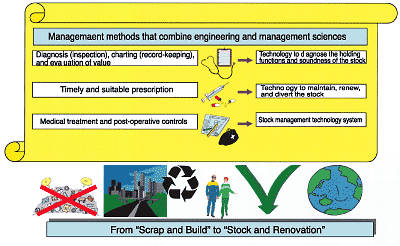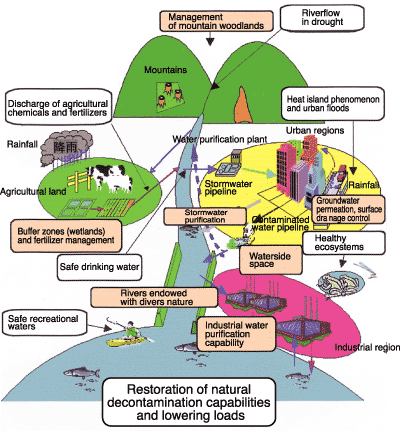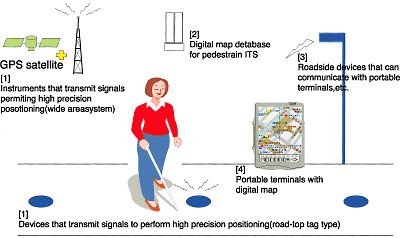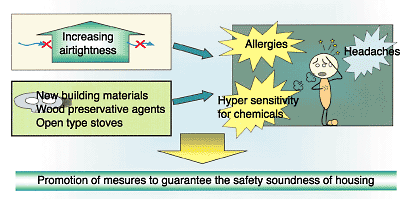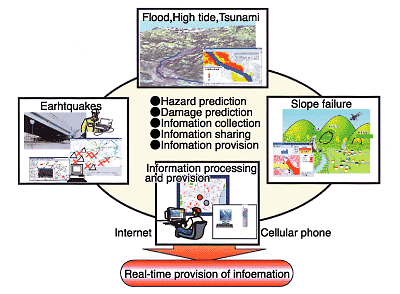| 1. Measures
against Global Warming |
| As a part of the Global Warming Research Initiative led by the Government, research
programs are conducted, such as technologies for satellite monitoring of precise
distribution of flora, measures to evaluate and reduce disaster risks caused by global
warming, technologies for ensuring harmonized built environment with nature, and
measures to reduce CO2 emission caused by vehicles. |
| 2. Toward
the Zero-waste / Resource-Recycling Society |
| In order to establish the sustainable and resource-recycling society, useful measures
are developed, which may suit reduction of construction waste and re-use/recycle
of resources. Also the systems for constructing and managing highly reliable offshore
waste disposal sites are developed. |
| 3. Stock
Management System of Housing and Infrastructure |
| In order to maintain the suitable function of housing and infrastructure as the social
capital, the rational Stock Management System is developed, which includes measures
to assess degrees of physical degradation and social outdating, as well as to evaluate
and predict the effects of improving functions through maintenance and renewal actions. |
| 5. Sound
Hydrological Cycle and Sediment Transport System |
| In order to promote holistic approach to ensure sound conditions of rivers and areas
around them, monitoring surveys to assess current states are conducted, taking these
areas as hydrological cycle and sediment transport systems. And soundness evaluation
methods, prediction methods and integrated management methods are developed. NILIM
is aiming to contribute and provide these methods utilizing as measures to cope with
droughts, floods and sediment-related disasters in Asian countries |
| 6. Toward
the Harmonized Watershed and Urban Area with Nature |
| As a part of Government Initiative, "Restoration of Watershed and Urban Area
harmonizes with Nature", environment monitoring in urban and watershed areas
is conducted. Management models and restoration technologies for those areas are
developed. These technologies restore watershed systems, ecosystems and urban circumstances.
NILIM is developing and implementing the scenario toward the harmonized society with
nature. |
| 7. Minimizing
natural disaster risks in urban areas |
| There exists high risk of natural disasters caused by earthquakes and heavy rainfall
in urban areas in which properties and people are highly concentrated. Toward minimizing
the natural disaster risks within limited resources, it is crucial to develop methodologies
of vulnerability assessment against natural disasters and cost-effective countermeasures
and appropriate combination of countermeasures from the risk management point of
view. |
| 8. Safety/Pleasantness
in Road Space |
| To enhance traffic safety and traveling conditions, research programs are conducted,
such as accident analysis, planning methods for safer road and traffic safety facilities,
design guides for road networks reflecting cultural/social context and economic activities
of respective region, measures to utilize road and related spaces, and Pedestrian
ITS which utilize IT to support sound mobility for pedestrians such as physically
impaired or elderly people. |
| 10. Measures
for Condominium Issues |
| In order to improve the quality of apartment/condominium, and to facilitate adequate
maintenance and smooth renewal, research programs for Skeleton-infill Dwelling System
are conducted. Also Methods for renovation/rehabilitation of existing condominiums
and renewal of condominiums, and interior systems fit for renovation of dwelling
units, including related regulatory system are developed. |
| 11. Regeneration
of the Built Environment |
| In order to promote redevelopment of high-density wooden building areas and revitalization
of central areas in local cities, it is crucial to develop measures such as socio-economic
methods that enables participation of owners of diverse characteristics to housing
renewal projects, new renewal systems adopting urban skeleton methods, and methods
to evaluate urban structure and quality of habitation in the urban area. |
| 12. Advanced
Assessment Methods for Public Works Projects |
| To ensure the adequateness of decision-making, transparency in the process and accountability
for people as public works, advanced assessment methods for Public Works Projects
are developed, which may fit for quantitative evaluation of external effect such
as impact on environment or effects for regional developments, and for evaluation
considering future uncertainties such as delay in project progress. |
| 13. Advanced
Cruise-Assist Highway System (AHS) |
| Advanced Cruise-Assist Highway System provides drivers with real-time information
about obstructions, vehicles approaching intersections, road surface conditions,
and so on, detected by road-side sensors, and with alerts warning dangerous conditions.
NILIM develops AHS and is aiming to achieve remarkable progress in driving safety. |
| 14. Appling
IT for Comprehensive Land Management System |
| NILIM develops Land Management System through integrating IT, GIS and remote sensing
technologies, establishes measures to share administrative information of national
land, for rapid collection of disaster information and forecasting of damage, or
for environment monitoring and assessment. |
